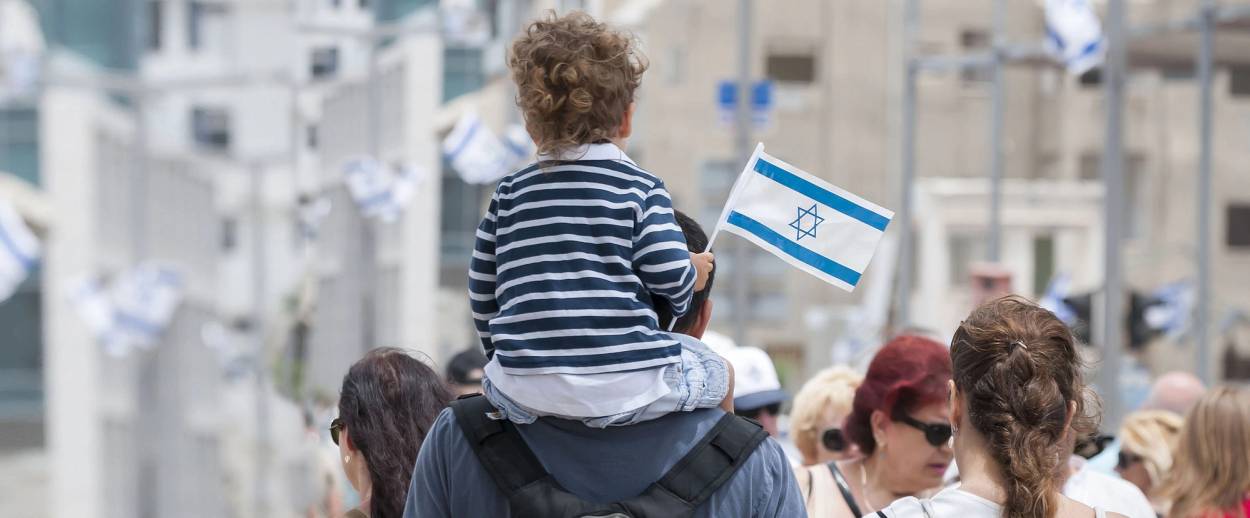Israel’s Real Enemy Isn’t Iran or the Palestinians. It’s the Idea of Crisis Itself.
Steeped in constant anxiety, Israeli leaders, left and right, offer no real vision for the future




The most important news story out of Israel last week had nothing to do with Moshe Ya’alon’s resignation as minister of Defense, or the controversial appointment of Avigdor Lieberman in his stead, or any of the other political reindeer games that regularly frustrate and amuse Israelis. Instead, it was a brief report that was forgotten as soon as it was published: Because of budgetary constraints, the Israel Defense Forces cannot afford to replace asbestos-ridden parts used in tanks and armored personnel carriers, putting the men who serve in these vehicles at risk of exposure to known carcinogens outlawed elsewhere in the country.
Don’t expect anyone to resign over this outrage anytime soon. Don’t hold your breath waiting for pundits to pontificate on national TV about ministerial responsibility, and don’t wait for politicians to deliver speeches promising change. In Israel these days, serious indignation is reserved only for the one true topic worthy of attention: The Crisis, a perpetual feeling of imminent doom that dominates the hearts and minds of leftists and rightists alike.
If you’re one of the few who still vote for the ultra-liberal Meretz, or among the thinning crowd that supports whatever the old Labor party is called these days, or even a supporter of the Willy Wonka of Israeli politics, Yair Lapid, your version of The Crisis is as follows: Consumed by constant war, Israel is sliding into fascism, with strongmen ever ascendant and with the foundations of democracy shaken daily by the goose-stepping of the nationalists and the religious. If you’re anywhere on the right, you take the same constant war as your point of departure but worry instead about the Palestinians, the Iranians, the Lebanese, the Syrians, and any number of neighbors wishin’ and hopin’ to bring the Jewish experiment with self-governance to a swift and bitter end.
Invisible from both these viewpoints are the soldiers in the asbestos-ridden tanks; the young Arab women and children in Umm al-Fahm, pushed by stupid neglect right into the arms of Islamic fundamentalists; the barely functioning police; the medical interns who are struggling with 26-hour shifts when their colleagues in Europe and America typically work between 12 and 16 hours at a time; the students down south who, unlike their peers in wealthier communities elsewhere in Israel, are repeatedly falling behind in math and other core subjects; the 150,000 toddlers who attend unsupervised day-care centers and receive abysmally unhealthy lunches; the residents of Jerusalem, many of whom are Arabs or fervently Orthodox Jews, more than half of whom are currently unemployed; the tens of thousands of Arab and Bedouin children in the Galilee and the Negev who benefited from three mobile libraries that the Ministry of Culture, for some reason, chose to shut down; and many other victims of tiny domestic dramas, all unseen, all eclipsed by The Crisis.
Of course, Israel’s security challenges are very real, and they demand very real responses, not to mention very real budgets that might’ve otherwise been allocated to a variety of other worthy causes. And of course, no country is without its imperfections, Israel having no less and no more than its share. Neither of these conditions are new, but Israeli leadership’s grim absence of any vision of the future may be: For the first time since it declared its independence, the Jewish State seems to have absolutely no idea what it wants to be when it grows up.
This is particularly dispiriting because Zionism, however you may define it, has a built-in answer to that question: Ahavat Yisrael, or love for the entirety of the Jewish people. Israel’s founding fathers and mothers might’ve bickered about whether the polity they were busy building would be a socialist utopia or a religious republic or a minuscule militarized empire, but all overcame their differences and came together to usher in the state because all realized that the Talmudic teaching about all of Israel being responsible for one another wasn’t just an arcane bit of religious wisdom but a sine qua non for future survival. The generations that followed in their footsteps were equally liberal in their infighting but also equally zealous about maintaining a society that strove mightily to give each Jew—and many non-Jews as well—a reason to look to the future with hope. To see this rich and lasting fabric increasingly covered by the dark cloth of a singular obsession with a largely imagined sense of impending doom is a tragedy, one from which Israel may not recover so soon.
Which means it’s time for those of us who care about Israel to radically change the way we think about it. Israel’s most deadly enemy isn’t Iran, or the occupation, or the Palestinians, or the haredis, or the settlers’ hilltop youth, or the radical lefty NGOs. It’s the very idea of crisis itself, and the way it’s being used to brush off a thousand less cataclysmic conversations that are nonetheless crucial to forging a caring and cohesive society. And it’s time we put an end to this closing down of the Israeli mind.
How? Let’s begin by abandoning useless distinctions. Benjamin Netanyahu is as guilty of perpetuating The Crisis as is Meretz’s Zehava Gal-On, and neither has taken any meaningful steps to kindle that flame of elected affinities without which a state is nothing more than a collection of individuals, ready to fall apart the first chance it gets. All Israeli politicians are expert at warning about looming catastrophe; none have taken the trouble to ponder what kind of society they may want to nurture on the off chance that disaster doesn’t strike and the end isn’t nigh.
Thankfully, ordinary Israelis are smarter than their lackluster leaders. In unofficial and nontrivial ways, they’re working out for themselves precisely the sort of thorny questions their elected officials ought to have raised and addressed. They demand security and zealously support their uniformed protectors, but when off-duty cops assaulted a young Arab man in Tel Aviv, Israelis raised $10,000 overnight to pay the man’s college tuition and show him that the Israel they believe in is first and foremost a land of opportunity and of empathy. Enjoying a dependably growing economy, they’ve grown as materialistic and insular as folks in affluent societies the world over, but when someone posted on Facebook that a young couple, both orphans, were about to get married and had no family or friends to invite to their wedding nor enough money to throw a proper party, hundreds of strangers showed up to show their support, their skills, and their cash, making it a night to remember for the two grateful orphans. Read the Israeli press with some regularity and you’ll find many other stories like these, tales of ordinary people craving communion. The task before any future prime minister, then, is simple: Capture this energy, use it to power good policy, and drive Israel out of its emotional and intellectual quagmire.
Our task is just as simple: We must refuse to believe that this miraculous nation was forged for no reason other than to be perpetually steeped in anxiety. We must never settle for a future that offers nothing but more of the same blunt struggle. We must fight for our security and our liberty, and we must be ferocious if ferocity is called for, but we must never forget that fighting is meaningless unless we know what we’re fighting for, and what we’re fighting for—what we’ve always been fighting for—is a promised land where Jews can thrive and help others, Jews and non-Jews alike. We have enemies, but the only ones who can truly thwart our progress are our own selves. The Crisis is over; now let’s get to work.
***
Like this article? Sign up for our Daily Digest to get Tablet Magazine’s new content in your inbox each morning.
Liel Leibovitz is editor-at-large for Tablet Magazine and a host of its weekly culture podcast Unorthodox and daily Talmud podcast Take One. He is the editor of Zionism: The Tablet Guide.